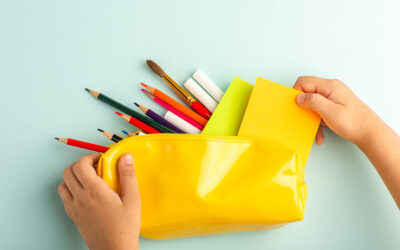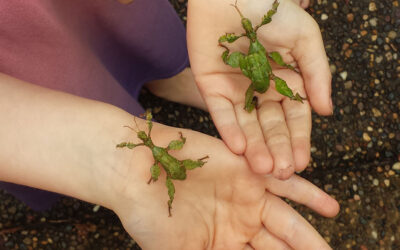Coronavirus, floods, war and other traumatic news … You could be forgiven for thinking you’re living in a repeating episode of Horrible Histories at the moment. The global disasters keep coming. These things are stressful for people of all ages. But what impact is this ongoing cycle of catastrophes having on your kids? And how do you talk to them about this, without causing unnecessary worry?
How do disasters and traumatic news affect kids?
News and imagery about impactful events like the recent flooding in south-east Queensland can be particularly upsetting for children.
Kids are like sponges. Even when you don’t think they’ve been exposed to things, they usually have been. From social media and other kids at school talking about things, to front covers of newspapers and snippets on the TV, there’s no way to fully insulate them from the 24/7 information cycle we now live in.
However, they might not yet have the ability to independently process their thoughts and emotions. This is why you need to talk with them about the content in a factual way.
How can parents help?
General manager at Parentline, Kimberley Harper says no matter the topic, parents need to check-in with themselves first.
“Parents really dictate what we like to call the ‘temperature’ of the conversation,” Harper says.
“Kids regulate off us in both positive ways and negative ways. If they are dysregulated it’s your job to regulate them again, but it goes both ways.”
Harper says if you’re overwhelmed and you’re really stressed then your children are going to feel that, too. “It’s a little contagious.”
She offers the following tips and tools for talking to your children about natural disasters and traumatic news.
Check-in
In addition to checking in with yourself, check-in with the kids, too. Your role as a safe adult in your child’s life is an important one.
“Sometimes it’s really handy just to start with, ‘What have you heard? What do you know?’,” Harper says.
“Start the conversation from that point and aim to keep it conversational, so they are always validated and heard.”
Use factual language
Harper says that in terms of language you want to keep the emotional language out of the conversation. Talk about the events or the trauma as factually as possible.
“Sometimes parents will instantly go to a bit of a baby talk, in the sense of goodies and baddies. Try to keep that out of it and stay away from the polarising spaces.”
However, it’s okay to use child-friendly language to help you explain what is happening.
Validate your child’s feelings
Tragedy can rattle everyone’s sense of safety, including your children’s. It’s really important, then, to validate what kids are feeling, without making that sense any worse.
“Let them know that it’s okay to feel scared about certain things,” Harper says. This helps them accept their feelings as being natural and normal.
Without burdening your children with adult concerns, you can also let them know how you are feeling about things and reassure them that “it’s okay for Mummy and/or Daddy to feel that way too,” Harper says. This approach avoids the risks of new fears being raised or providing information to them that is not useful.
Be curious together
If they are feeling like the end of the world is coming and can’t see any perspective, Harper recommends seeking out reliable information together.
“Even when kids say something that is really wrong, instead of instantly correcting them, be curious together and find answers together,” she says.
“Remember, there’s a lot of information and although parents are expected to have all the answers, it’s not always the case! If it’s information you don’t understand, head for kid-friendly resources to find the answers.”
The process of finding where to get the information and going through the steps to obtain it can be a reassuring one for your child, especially when you do it with them. It also demonstrates that even in times of natural disaster or traumatic news there is still an orderly way to solve problems.
Keep some perspective
It also helps to find a way to put things into perspective, and don’t over-explain either!
“For little kids, it helps looking at a globe or map, to provide context,” Harper says.
“Have these conversations in a calm, educational way. Steer clear of doomsday scenarios and spiralling into ‘what ifs’.”
Reassure your child
You want to provide your child with the reassurance that things will get better, that you will be there for them, that they can ask you questions at any time, and that they and the people they care about are safe. Ensuring that our little ones feel safe is still paramount in these conversations.
“Reassure them that there are people in this world whose job it is to make sure we’re okay,” Harper says.
Where there is tragedy, there is also heroism. Talk about the different jobs around the world, such as the peacekeepers who negotiate between countries and the SES that make sandbags to protect from floods. Highlight the forces of good who spring into action and restore faith in humanity when it has been shaken.
Look for the positives
Rather than dismiss their fears, Harper recommends finding a way to turn it into a positive action.
“I really like the idea of looking at positive, practical ways to get involved. Find things that you can do together, as a family,” she says.
“Looking at organisations and charities that help and, see how you can help. Putting it into space of charity and altruism gives it a sense of action and positivity, with something you can do together.”
Other suggestions for how you and your child can act positively include:
- Sending thank you notes to doctors, paramedics, firefighters and/or police.
- Writing a letter to the editor of your local newspaper.
- Raising money for charities that support disaster recovery or traumatic causes.
Such activities help children step out of their position of feeling powerless.
Don’t ignore the topic
What is happening in Ukraine, and the recent floods throughout south-east Queensland and northern New South Wales communities can be frightening for both children and adults. However, avoiding topics like natural disasters and traumatic news can lead to children feeling more scared.
“It is essential to have open and honest conversations with children [about traumatic events] to help them process what is happening,” Harper says.
By listening calmly, avoiding judgement or dismissing what your child is saying, you are also positioning yourself to reassure them that their fears aren’t so big that they can’t be dealt with.
Make time and listen fully when your child wants to talk.
You may also like…
Balancing the busyness — parenting support from Parentline
How to talk to your kids about the coronavirus
Simple ways to bring back the belly laughs with the kids


